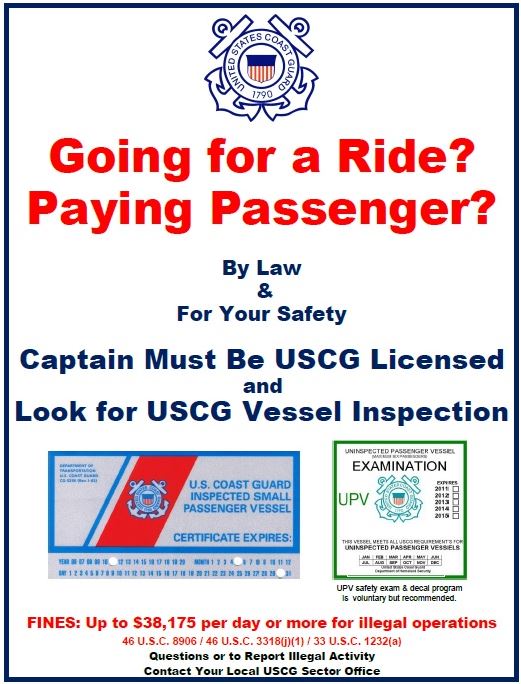Written by Lt. Cmdr. Baxter Smoak, Office of Investigations & Casualty Analysis
My colleagues and I recently attended the Passenger Vessel Association/Coast Guard Quality Partnership meeting in Annapolis, Maryland, to address one of the leading topics on the agenda: combating illegal passenger vessel operations because of the danger they pose to unsuspecting or ill-advised passengers as well as to the legitimate commercial passenger vessel industry. We recognize it is critical for the Coast Guard and the passenger vessel industry to work together to find a solution.
Illegal operations and the potential dangers they present have existed since the inception of passenger vessel regulations. In recent years, however, the introduction of certain smart phone apps to the hospitality and transportation industries has exacerbated the issue by making it easier for property owners to enter into agreements to temporarily lease, charter, or rent their homes or vehicles to interested parties for compensation. As expected, emerging business ventures are now dedicated to boat rentals and water taxis using similar business plans and smart phone apps. For owners and operators of properly licensed and certificated vessels as well as their customers, this is likely a welcome convenience that will increase opportunities and accessibility. However, these new ventures also make non-compliant operations more accessible, which increases the threat to public safety, licensed mariners, and those who follow federal safety, security, and environmental protection regulations.
Owners and operators must comply with federal regulations governing the operation of commercial passenger vessels regardless of the mode customers use to reserve the vessel. Failure to adhere to federal regulations can result in significant civil and criminal penalties. For example, failure to comply with a Captain of the Port order to cease unsafe operations can result in a civil penalty of $90,063 per day of continued operation, up to a total fine of $250,000. Continued violations constituting a class D felony, including punishments of up to ten years in prison, may also apply. In addition, failure to comply with safety, licensing, or vessel manning requirements can result in civil penalties up to $38,175 per violation. Illegal operations by individuals who are either unaware of or avoiding U.S. laws and Coast Guard regulations governing operator credentialing requirements, vessel inspections, operational standards, and safety equipment pose serious safety concerns to the public and the environment, but also adversely impact the livelihood of legitimate operators who do comply with federal requirements. Recent accidents, including those with loss of life, highlight the need for coordinated near-term actions and long-term solutions. The Coast Guard is dedicated to investigating these violations and taking the appropriate enforcement actions to ensure compliance and public safety.
Credentialed mariners who work for multiple vessel owners/operators should be aware that if they accept employment from an illegal operation, they risk not only passenger safety, but their own credential, livelihood, and reputation. The Coast Guard strongly advises licensed mariners to avoid unlawful and dangerous operations including, but not limited to:
• Operating a bareboat charter with a pre-designated crew or that carries more than 12 guests aboard. A “bareboat charter” is defined as paying for the use of a vessel only and does not include fuel, crew, insurance, etc. To qualify as a bareboat charter, the owner of the vessel must provide the charterer with full authority to choose the composition of the guests to be carried, including any potential crew members.
• Operating a vessel without a required Certificate of Inspection (COI). Vessels that carry more than six passengers with at least one for hire are required to be certificated by the Coast Guard.
• Operating a 6-Pack that does not meet the Uninspected Passenger Vessel (UPV) requirements.
• Failure to have the appropriate level of license or endorsement, such as a charter service that carries “passenger(s) for hire” without a valid Coast Guard issued Merchant Mariner’s Credential suitable for the vessel’s service. “Passenger for hire” is defined as an operator who takes or accepts compensation, including compulsory donations or payments for fuel or supplies in exchange for services aboard a vessel.
• Violating a Captain of the Port (COTP) Order. After identifying noncompliance with the federal safety requirements, COTPs leverage their authority by placing administrative controls on noncompliant vessels. These orders direct the vessels to immediately cease operations as commercial passenger vessels until they comply with all federal laws and regulations. Failure to comply with the order can result in action against the owner or operator.
• Inappropriate insurance and liability coverage. Although outside the scope of the Coast Guard’s regulatory authority, failure to carry appropriate insurance coverage should be a concern for any credentialed operator.
The Coast Guard continues to address potential illegal charters on a case-by-case basis. Recent surge operations targeting illegal passenger vessels in the Chicago area showed the benefits of collaboration between marine safety personnel, Coast Guard Investigative Service special agents, boarding officers, local law enforcement, and industry. Charter services found to be operating illegally were and will continue to be subject to civil or criminal penalties. The Coast Guard urges passengers to request to see the vessel operator’s valid credential and/or proof of any required inspection or examination before hiring any crewed charter vessel, water taxi, or other type of waterborne transportation, to ensure they possess a Coast Guard issued Merchant Mariner’s Credential suitable for the vessel’s service. Passengers are taking an unnecessary safety risk by riding on a vessel without a credentialed mariner in charge or aboard an uninspected vessel subject to federal regulations.
The Coast Guard is committed to commercial and recreational boating safety on our shared waterways, but we need your help. Legitimate operators and credentialed mariners are encouraged to report suspected illegal passenger vessel operations to the local Coast Guard unit.
